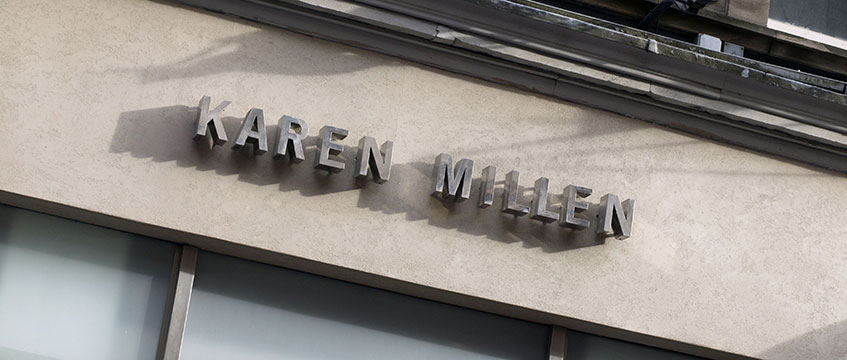Will Boohoo’s Karen Millen acquisition set a new trend for retail M&A?
Boohoo’s £18.2m deal to acquire the online businesses of Karen Millen and Coast out of administration is the latest example illustrating the widening polarisation between online and physical retail.
Administrators at Deloitte said Karen Millen’s 32 stores will continue to trade for a “short time” while the assets are sold off. This is taking place regardless of its previous click-and-collect model.
Even though both brands generated total online sales of £28.4m during the year to 28 February – representing only 16% of its £174.1m revenue – Boohoo’s pointed lack of interest in the bricks-and-mortar aspect appears to signal the increasing irrelevance of stores to both upmarket retailers and affordable clothing brands, at both ends of the scale.
Boohoo’s £18.2m deal to acquire the online businesses of Karen Millen and Coast out of administration is the latest example illustrating the widening polarisation between online and physical retail.
Administrators at Deloitte said Karen Millen’s 32 stores will continue to trade for a “short time” while the assets are sold off. This is taking place regardless of its previous click-and-collect model.
Even though both brands generated total online sales of £28.4m during the year to 28 February – representing only 16% of its £174.1m revenue – Boohoo’s pointed lack of interest in the bricks-and-mortar aspect appears to signal the increasing irrelevance of stores to both upmarket retailers and affordable clothing brands, at both ends of the scale.
At a time when it has become practically second nature for physical retailers to seek ways to escape lease agreements and fixed property costs that they cannot jettison overnight – as evidenced by the tidal wave of CVAs among the likes of Arcadia and Monsoon Accessorize – could it signpost the start of a new precedent for online takeovers?
Several industry figures believe Boohoo’s acquisition could lead to further similar deals.
Allan Lockhart, chief executive of landlord NewRiver REIT, says: “We may well see more consolidation, but it is likely to happen with the fashion brands, given that 30-40% of all fashion sales transact online.
“The issue for online retailers is that the delivery and returns costs are astronomical, entirely unsustainable and erode margins heavily. Scale becomes very important therefore as it drives efficiencies and economies of scale. Simply put, the bigger you are, the more you can spread the cost through scale benefits.”
Such deals are expected to be largely confined to fashion retail. “Online penetration is low in grocery, discount and health and beauty – sub-sectors on which NewRiver is focused – and the physical store remains fundamental to these operators,” says Lockhart, pointing to the likes of Primark, Lidl, B&M and Poundland.
Meanwhile, the ability to consolidate product sourcing is likely to be an appealing prospect for traditional fashion retailers as well.
With Boohoo upgrading its automated warehouse operations to accommodate net sales of £3bn per year, the Karen Millen and Coast brands are in a good position to reduce costs and substantially improve lead times.
Colin Godfrey, partner at Tritax Big Box REIT, which counts Amazon among its clients, says it is likely that more online businesses will buy up brands with physical stores once they scale up.
“Boohoo is a very successful and efficient business – there is an element of balance sheet power,” says Godfrey. “The fledgling online companies may not necessarily have that power, but over time that may change, subject to investor backing.
“It is also about the traditional high street retailers adapting and embracing online quickly and efficiently, to complement their high street offer and enable them to compete with the likes of Boohoo.”
On the other hand, independent retail analyst Richard Hyman is not convinced there is enough appetite for such deals for them to form a more extensive trend.
“It is possible there will be one or two more, but this is a rather unusual deal,” Hyman says. “The gap between Boohoo’s customers and those of Karen Millen and Coast is considerable. But certainly a business like Boohoo will be able to strip out a lot of costs and use its own back-of-house operations, up to a point. [And] there are a lot of retail businesses out there that are no longer economic the way they are.”
Moreover, pure-play online retailers are not as untouched by the woes of the high street as many perceive them to be. Hyman highlights Asos as an example, which in July issued its third profit warning in the year to date.
Hyman says: “It is very seductive for some to think, in today’s retail market, that everything would be all right if they could only get rid of the stores. This is rather naïve – that just isn’t the case.
“Boohoo is on a roll. Asos was too, until not so long ago – its situation demonstrates that online retailing isn’t quite as profitable as it thought it was. Online retailing has its own costs.”
To send feedback, e-mail pui-guan.man@egi.co.uk or tweet @PuiGuanM or @estatesgazette
Photo: Photofusion/Shutterstock











